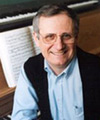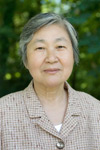2012 Sejong Music Composition Competition
Judges
Shih Hui Chen | Hi Kyung Kim | Geonyong Lee | Jan Radzynski | Younghi Pagh-Paan

A citation accompanying Shih-Hui Chen’s 2007 Goddard Lieberson Fellowship from the American Academy of Arts and Letters states, “Among the composers of Asian descent living in the U.S.A., Shih-Hui Chen is most successful in balancing the very refined spectral traditions of the East with the polyphonic practice of Western art-music. In a seamless narrative, her beautiful music, always highly inventive and expressive, is immediately as appealing as it is demanding and memorable.”
Born in Taiwan, Shih-Hui Chen has lived in the United States since 1982. Since completing her doctorate degree from Boston University, Chen has received significant recognition for her work including a Koussevitzky Music Foundation Commission, a Guggenheim Fellowship, and an American Academy in Rome Prize. Chen’s compositions have brought her into contact with many orchestras, including the Philadelphia Orchestra, Cleveland Orchestra, Boston Modern Orchestra Project, Cleveland Chamber Symphony, and Utah Symphony.
Shih-Hui Chen currently serves on the faculty at the Shepherd School of Music, Rice University. In 2010, Chen was awarded a Fulbright Scholar Grant to live in Taiwan for a year to research Taiwanese Aboriginal music and Nanguan music at National Taiwan University and Academia Sinica. While at Sinica, she collaborated with anthropologist and filmmaker, Taili Hu on a film project, Returning Souls, that documents customs of the Aboriginal Amis Tribe and their recovery of a lost tribal icon. Chen adapted materials from the film soundtrack for use in a solo violin piece for Cho-Liang Lin. In the spring of 2013, the film and violin work will be paired in a multidisciplinary event that will tour 6 universities across the U.S., including Harvard, Columbia, and U.C. Berkeley. 2013 will also see a premiere by Appassionata Chamber Orchestra in Montreal Canada, and three recording releases, one of which will be a CD entirely devoted to her works by New World Records.

Hi Kyung Kim, born in Seoul, Korea (1954), is a composer whose work is noted for its creative unification of contemporary Western and traditional Korean musical vocabulary, philosophy, art forms, and performers. Kim received a B.A. in composition from Seoul National University, where she studied with Sung-Jae Lee. She completed her M.A. and Ph.D. from UC Berkeley under the mentorship of Andrew Imbrie and Olly Wilson. At Berkeley she received the George C. Ladd Prix de Paris, which enabled her to work at the Institut de Rechéreche et Coordination Acoustique Musique (IRCAM) and the École Normale Supérieure in Paris (1988-1990) as a student of Gérard Grisey. Since 1992 she has been on the faculty of the University of California, Santa Cruz, where she is a Professor of Music. Kim is also the founding Director of the Pacific Rim Music Festival.
Among the honors Kim has received are the Walter Hinrichsen Award from the American Academy of Arts and Letters, commissions from the Koussevitzky Music Foundation from the Library of Congress, Fromm Music Foundation from Harvard University, a Meet the Composer/Commissioning USA grant and Arts Council Korea, a Fulbright Scholar award, as well as grants from the University of California Inter-Campus Arts Program, the Asian Cultural Council and the Korea Foundation.
In the past 2 decades Kim has collaborated with number of Korean artists such as Aeri Ji (gayageum), Jeong-Seung Kim (daegeum), Sang-Hun Kim (ajaeng), Soo-Neon Chung (haegeum), Eun-Ha Park (percussion & dance), Aeju Lee (dance), and Bohnchang Koo (visual images). These artists, internationally recognized for their contributions to Korean traditional music and art forms, have participated in several of Kim's recent compositions. She presented the Festival for Korean Gayageum and Western Instruments in 2007 in collaboration with Eun-Ah Kwak and Premiere Concerts with the Contemporary Music Ensemble Korea (Jiyoung Yi, director) in 2010. Also Ms. Kim has been the artistic director of the ANDREW IMBRIE FESTIVAL in 2001 and in 2011.
Her recent projects have included three major multi-media works titled “RITUELS” for Korean and Western ensembles and Korean dance. These productions were featured at several venues world wide, including Walt Disney Concert Hall (Los Angeles), Herbst Theatre, Palace of Fine Arts (San Francisco), and the National Center for Korean Traditional Performing Arts (Seoul). In 2012-2013, new projects will be presented-- a new collaborative and multi-disciplinary work, THOUSAND GATES by the Ensemble RITUEL; String Quartet, HAN SAN by Borromeo String Quartet; and ISLE OF EEO by the Chamber Music Society of Minnesota.
Hi Kyung Kim has been the artistic director of the Pacific Rim Music Festival, which was founded in 1996. This festival has gained international recognition for bringing together both Eastern and Western performers and composers at the forefront of their fields, as well as artists and music from other Pacific Rim countries. Kim was a guest composer and a keynote speaker at the Korean Society of Woman Composers in 1994. She was a featured composer for the Hún Qiáo [Bridge of Souls] project Premiere Concert of Remembrance and Reconciliation, presented by the Chamber Music Society of Minnesota with guest artist Yo-Yo Ma in 2001. She was invited as a composer to represent the third generation composer at the Asia Society in New York for the Four Generations of Asian Composers project in 2007, and she was invited to the UNESCO 2nd World Conference on Arts Education as a keynote speaker and a composer in 2010.

Geonyong Lee was born in Pyongannam-do, Korea 1947 as fourth son of a pastor, who possessed high attainments in music. He started to compose songs since his age twelve. Lee played oboe in school band in Seoul Middle School. He studied composition with Dal-Sung Kim at Seoul High School of Music and Arts and with Sung-Jae Lee at Seoul National University. 1976 he went to Frankfurt am Main, Germany and studied composition with Heinz Werner Zimmermann at Frankfurter Musikhochschule. After the study in Germany he returned to Korea and taught composition in Hyosung Woman's University and in Seoul National University. From 1992 he is teaching composition in the School of Music, Korea National University of Arts, where he served as the president 2002 to 2006.
Though he studied mainly European modern music, he tried to find his own style in harmonizing Korean traditional music and western contemporary music. He is one of the pioneers in the use of Korean traditional music idiom in is musical language. The series of chamber music, Song in the Dusk I to VII, are examples of this tendency.
He also recognized as a successful composer for Korean traditional instruments. He composed many solo pieces for Kayageum, for Komungo and for Haegeum. Variations on Hanobaeknyun for Kayageum and Haegeum Garak are ones of most beloved repertories by players.
He has written a lot of vocal music in various genre from art-song to opera. He is known as a composer with profound understanding in literature. (When he was university student, he deeply involved with novel and theatre. He wrote short stories, one of which won the prize of a newspaper, and acted many roles of drama.) Song Collection If we were water-flow, Cantata Song of Lazarus and Behold the flower, Passion Passion of Jesus Christ and Opera Spring Spring and A Little Monk are some of examples of many works of this area.

Jan Radzynski (b. 1950 in Warsaw, Poland). Jan Radzynski left his native Poland in 1969. He studied composition in Israel with Schidlowski at the Tel Aviv University Academy of Music, and in the United Stated with Krzysztof Penderecki and Jacob Druckman at Yale University, where he received his doctorate in 1984. He is presently Professor of Composition at Ohio State University in Columbus.
Radzynski's awards include Distinguished Scholar Award, Ohio State University (1996), Creative Work and Research Grant form the Rothschild Foundation (1995), Residency in Mishkenot Sha'ananim, Jerusalem (1995), Ohio State University Faculty Seed Grant (1994). Individual Artists Grant from the Connecticut Commission on the Arts (1992), ASCAP Standard Awards (1989-97), the Frederick W. Hilles Publication Grant (1990), Mellon Fellowship (1985), Yale University Griswold Research Grants (1984, 1987-93), and the Summer Residency at the Foundation Artist's House, Boswil, Switzerland (1983). In 1983 Radzynski's Kaddish was recorded by the Jerusalem Symphony received a special commendation at the International Rostrum of Composers in Paris.
The compositions of Jan Radzynski have been performed by the Cleveland Orchestra, Columbus Symphony, Cracow Philharmonic, Jerusalem Symphony, Radio Orchestra (Cologne), Mexico National Orchestra, Saarbücken Radio Orchestra, Israel Chamber Orchestra, New Haven Symphony, and Israel Sinfonietta, among others.
His compositions are recorded on CRI and Channel Classic labels.
Radzynski's recent commissions include the String Trio commissioned by the City of Aachen premiered there in May 1995 by Trio Arco. His Shirat Ma'ayan for mezzo soprano, tenor, and orchestra, commissioned by the Rothschild Foundation and the Haifa Symphony was premiered in Israel in June 1997. His new composition for violin and piano, Personal Verses, was premiered in April 1999 in New York's 92nd Street Y.

Image copyright
Harald Rehling
Younghi Pagh-Paan was born in 1945 in Cheongju, South Korea. She studied at Seoul National University from 1965 to 1971. In 1974 she travelled to Germany on a DAAD scholarship.
She studied at the Freiburg University of Music with Klaus Huber (composition), Brian Ferneyhough (analysis), Peter Förtig (music theory) and Edith Picht-Axenfeld (piano), graduating in 1979. In 1980/81 she obtained a scholarship from the Heinrich Strobel Foundation of Southwest German Radio, and in 1985 from the Baden-Württemberg Art Foundation.
She established an international reputation with the premiere of her orchestral work Sori at the 1980 Donaueschingen Festival. Further premieres at the same festival followed in 1987, 1998 and in 2007. She began to receive international awards early on, including 1st Prize at the 5th Composers' Seminar in Boswil (Switzerland) in 1978, 1st Prize at the Rostrum of Composers (Unesco, Paris), the Nan-Pa Music Prize in Korea and the 1st Prize in the Stuttgart Competition. In 1980/81 she obtained a scholarship from the Heinrich Strobel Foundation of Southwest German Radio, and in 1985 from the Baden-Württemberg Art Foundation. In 1995 she was awarded the Heidelberg Prize for Artists.
Following guest professorships at the University of Music in Graz (1991) and Karlsruhe (1992/93), Younghi Pagh-Paan became Professor of Composition at the University of Arts Bremen (1994). There she founded the Atelier Neue Musik, which she has headed since then. She retired from teaching in 2011 in Bremen.
Further awards include those received in recent years from her home country of Korea: the Lifetime Achievement Award from Seoul National University (2006), the Order of Civil Merit of the Republic of Korea (2006), and the 15th KBS Global Korean Award (2009). In 2009 she became a member of the Academy of the Arts, Berlin.
In 2011 she received the Medal of Culture and Science Award from the governing Mayor of Bremen. She lives in Bremen, Germany and Panicale, Italy.